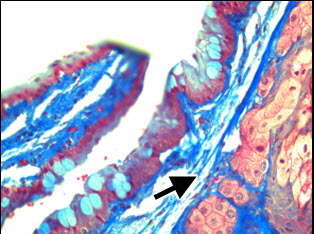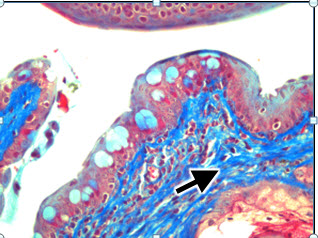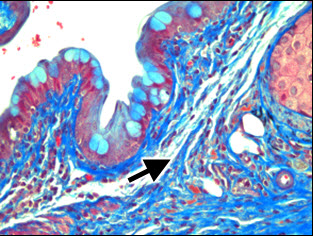Duke Eye Center researchers have discovered a key immune cell type that causes fibrosis in the conjunctiva, called the dendritic cell.

Normal Conjunctiva (arrow)
with Dendritic Cells
Dendritic cells are a type of white blood cell, which reside in most tissues of the body. These cells also reside in the mucosal lining of the eyelids, called the conjunctiva. In health, the conjunctiva lubricates and protect our eyes. However, diseases that cause scarring, or fibrosis, of the conjunctiva result in chronic eye pain and may lead to blindness. Eye diseases where this type of fibrosis occurs include severe eye allergy, pemphigoid, a rare autoimmune disorder and trachoma, a contagious bacteria infection of the eye.
In a study published online August 4, 2016 in Journal of Clinical Investigation Insight, a team of researchers lead by Dr. Daniel Saban from Duke Eye Center, and key collaborator Dr. Virginia Calder from University College London (UCL) Institute of Ophthalmology, present their completely unexpected discovery.

Fibrotic Conjunctiva with
Dendritic Cells
The main function of dendritic cells is to act as the sentinels of the immune system. To their surprise, however, they observed that these cells directly stimulate fibroblasts in the conjunctiva. Fibroblasts are cells that normally help in tissue repair. However, Dr Saban’s team found that in disease, fibroblasts are activated by dendritic cells. This pathogenic interaction results in a functional change in fibroblasts that in turn drives fibrosis, as shown in the figures.

Fibrotic Conjunctiva without
Dendritic Cells
The factor involved in this disease process is a Vitamin A metabolite, called retinoic acid. Dr John Dart’s collaborators, at Moorfields Eye Hospital and UCL, revealed the pathogenic nature of this factor in conjunctival scarring from patients suffering with ocular pemphigoid.
Together these findings now open up a new research vista for the development of novel therapeutic targets against certain dendritic cells or the retinoic acid pathway to potentially combat fibrosis.
Both research papers are published in the Journal of Clinical Investigation Insight.